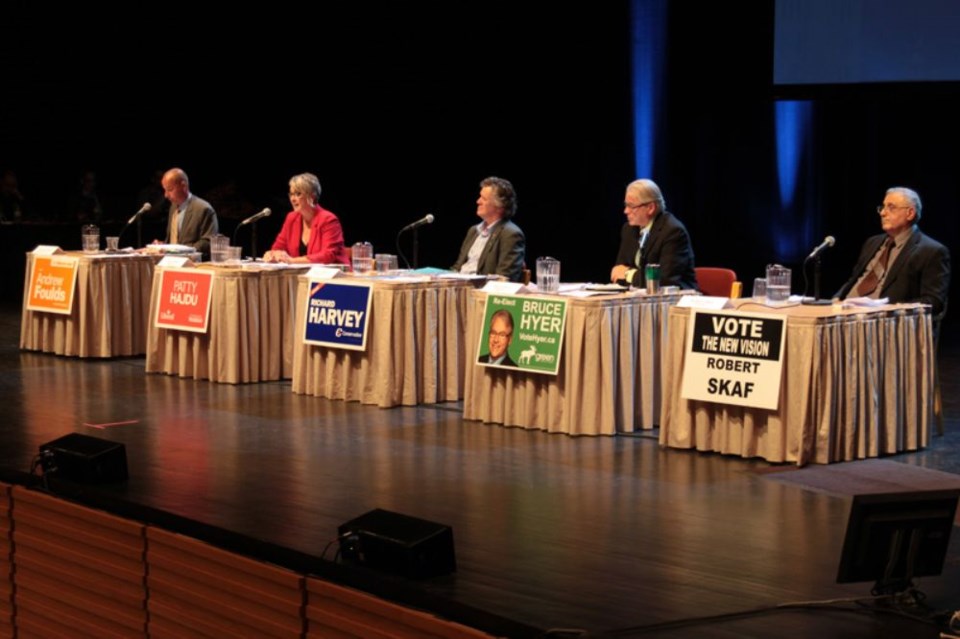THUNDER BAY – Tuesday’s debate made one thing clear: constituents in the Thunder Bay-Superior North riding want their MP to speak independently for them.
From whipping votes to MPs crossing the floor to prorogation, democratic reform and freedom of speech for government employees, democracy was the debate's deepest theme.
The matter produced the evening's most candid moments, as every candidate found themselves with the upper hand at times and one shoulder on the mat at others.
No candidacy is so complex on the subject as that of the incumbent Bruce Hyer, who was punished by the NDP for voting to abolish the long gun registry. Hyer then left the party over a clash with leader Tom Mulcair to become the second consecutive MP from Thunder Bay-Superior North to part ways from the party that appeared next to their name on the ballot when they were elected.
Sitting as an independent and then as a Green Party MP, Hyer has championed free votes, advocated for proportional representation and led the charge against closing the Experimental Lakes Area full-ecosystem laboratory near Vermillion Bay. Eight of the 19 bills he has introduced have aimed to redistribute power away from the Prime Minister's Office and the party structure.
"Parties aren't even mentioned in the Canadian constitution. From 1867 to 1970, all that was on the ballots was their name and their occupation. The Constitution makes it clear that MPs are intended to represent their constituents -- end of story," Hyer said.
Conversely, NDP candidate Andrew Foulds, Liberal Patty Hajdu and Conservative Richard Harvey all spontaneously committed to personally bringing forth legislation that would require any MP crossing the floor to run in a by-election that would confirm their electorate's support.
Hajdu cited her experience in moderating the needs of more than 30 agencies in creating Thunder Bay's Drug Strategy to demonstrate the party system as a balance between advocacy and compromise.
"Why do people vote for parties? Because it's a team. Because you're stronger together. When you work together, you have an opportunity to move things forward in a way that's not possible as a solo voice," she said.
"All of Bruce Hyer's pomp is deflection for his inability to work as a team. The honourable thing to do if you declare a difference with your team that is irreconcilable, is to resign from that team and resign from that seat and run in a by-election."
Carrying the banner for Hyer's former party, Foulds locked horns with the incumbent on democracy as much as he did with Hajdu on social policy. As he argued the NDP platform would rebuild Canada's environmental and democratic oversight, he also argued he was the candidate who could deliver on that platform.
"You deserve the confidence in knowing who you're voting for and the platform you're voting for," Foulds said.
"And when you have that confidence, you have the security of knowing what that person will stand for."
As a hopeful MP for the Conservatives, Harvey was under incumbent-like pressure. Running in a riding where his party hasn't won in 84 years, he also had to bear the weight of a nine-year sitting government whose leadership has transformed the public discourse around democracy. He pointed out the Conservative Party enshrines the right to vote one's conscience in its constitution.
When the point was raised that no party leader has visited any First Nation in the riding, Harvey stood on his record as an elected representative. Having lived in First Nations and been the first mayor in the area to sign a Memorandum of Understanding with a First Nation, Harvey touted his experience as representative of the riding in a way party leaders can tap into.
"The reality is there are many different community groups that the leaders don't necessarily have the opportunity to meet with.
“They have to rely on the candidates and members of their party," he said. "We work together. We are all treaty people and we need to work together to find solutions to these problems."
Independent Robert Skaf made frequent mentions to the Prime Minister as the "commander in chief, the scientist in chief
"There's no way I would run for a party that would say to me why and what I should be doing. This is why I'm running as an independent. Democracy demands free spirit and fee discussions. The current system doesn't allow that," Skaf said.
"We need leadership and it doesn't come with people toeing the line every day, every minute."
